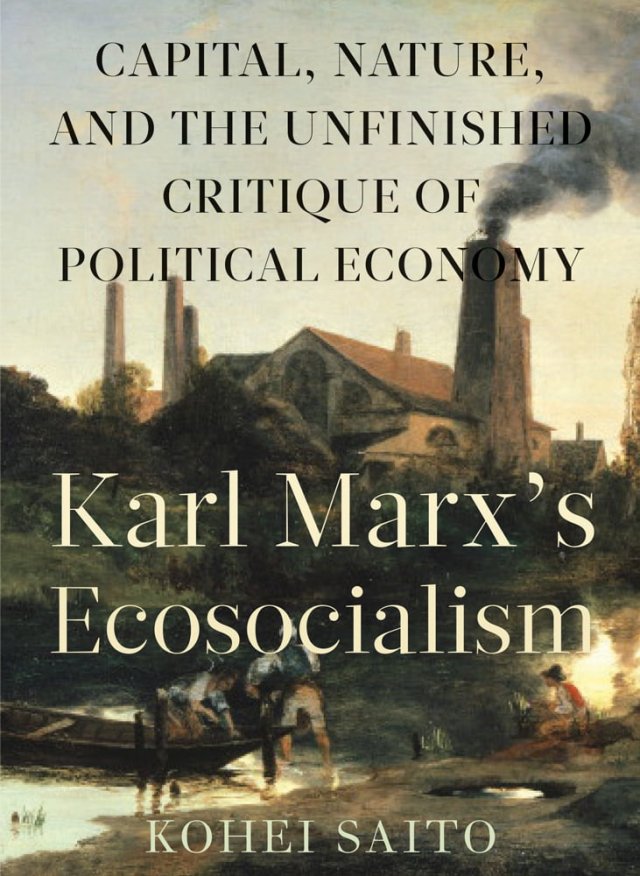
Over the past three decades, US-based Marxist journal Monthly Review has stood out as a major source of ecosocialist analysis. This has been especially evident in recent months, with the publication by Monthly Review Press of three pathbreaking books:
- Kohei Saito’s Karl Marx’s Ecosocialism: Capital, Nature, and the Unfinished Critique of Political Economy;
- Ian Angus’s A Redder Shade of Green: Intersections of Science and Socialism; and
- Fred Magdoff and Chris Williams’ Creating an Ecological Society: Toward a Revolutionary Transformation.
Saito’s Karl Marx’s Ecosocialism is an extraordinarily important work that deepens and extends our analysis of how Marx sought to integrate ecological materialism and an understanding of ecological crisis into his critique of political economy.
Saito gives new significance to what has been called Marx’s theory of metabolic rift, by showing how Marx used his concept of social metabolism to ground his value analysis in the ecological conditions of production, incorporating a conception of natural limits.
At the same time, he brings new evidence to bear by exploring the ways Marx continued to develop this ecological critique, as revealed in his little-known or still unpublished natural-scientific notebooks.
Karl Marx’s Ecosocialism thus represents an enormous expansion of our understanding of Marx. It reinforces and extends the interpretations offered in earlier works such as Paul Burkett’s Marx and Nature (1999) and John Bellamy Foster’s Marx’s Ecology (2000). The widespread failure for many years to recognise Marx’s contributions to ecology was mainly a product, Saito argues, of the biases of so-called Western Marxism.
Following his major work Facing the Anthropocene (Monthly Review Press, 2016), Angus’s A Redder Shade of Green consists of a set of elegant and needed interventions in debates related to ecosocialism and science.
It is divided into five parts: (I) “Natural Science and the Making of Scientific Socialism”. (II) “Responding to the Anthropocene”, (III) “Numbers Are Not Enough”, (IV) “Saving Species, Saving Oceans”, and (V) “Toward an Ecological Civilization”.
Over the course of the book, Angus takes on critical issues such as Marx’s relation to science and Darwin; the denial of the Anthropocene concept by some on the left; the growth of ecomodernism; “The Return of the Population Bombers”; biodiversity; and “The Myth of ‘Environmental Catastrophism’.”
The brilliance and succinctness of this analysis and its concrete engagement with crucial debates make A Redder Shade of Green at once a useful introduction to ecosocialist thought for the uninitiated and a valuable corrective for readers already well-versed in ecological Marxism.
Magdoff and Williams’ Creating an Ecological Society is perhaps the most comprehensive, yet accessible analysis available of the changes needed to cope with the world’s growing ecological and social crises.
Written by scholars equally versed in natural and social science, it is full of considerations of the radical changes demanded by the depredations of capitalist society. It is a book full of revolutionary hope. It not only rejects business as usual, but emphasises the needed rupture with existing social relations that this would require.
As they write: “The word revolution is currently used by all manner of people in very different contexts … It is therefore important to define what we mean by revolution, which to us means the total rearrangement of social power and its reconstitution on the basis of substantive equality. In other words, the only way to create an ecologically based society is by creating a classless society based on cooperation and the democratic decisions of the entire population.”
Taken together, these books offer a powerful, historically grounded argument and a way forward.
[Abridged from Monthly Review.]
Like the article? Subscribe to Green Left now! You can also like us on Facebook and follow us on Twitter.